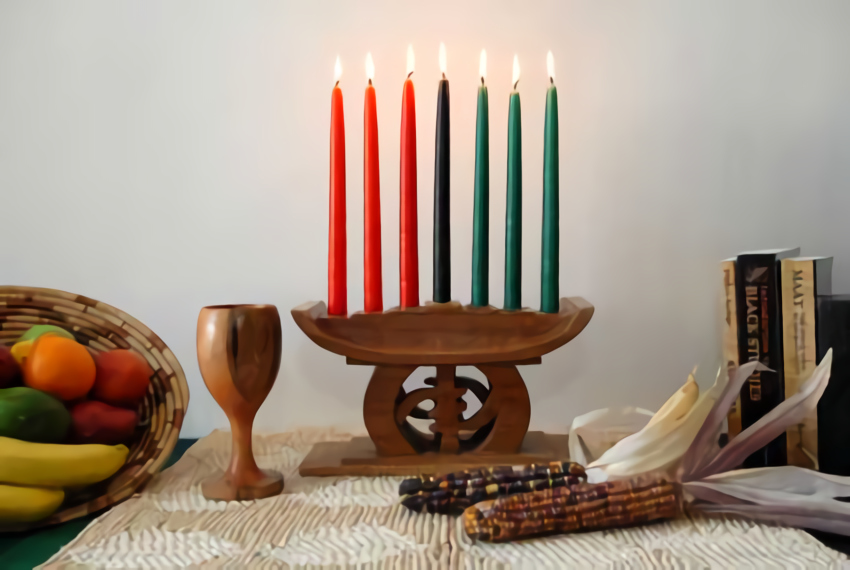Kwanzaa is a “synthesis of continental and diasporan African cultural elements”

The Gye Nyame Kwanzaa set includes a candleholder, candles, unity cup, corn and mat. Source: officialkwanzaawebsite.org
7-day celebration began Monday
By Allen D. Payton
Kwanzaa, the annual, seven-day African American and pan-African celebration of family, community, history, heritage and culture, was created in the 1966 by Dr. Maulana Karenga, professor and chair of the department of Africana Studies at Cal State University, Long Beach. Each year it begins the day after Christmas on December 26th and continues through January 1st.
According to edarabia.com, “The term ‘Kwanzaa’ originates from the Swahili expression ‘matunda ya kwanza’, which means ‘first fruits of the harvest’.
During the holiday, families and communities gather to honor and remember The Seven Principles of Unity, Self-Determination, Collective Work and Responsibility, Cooperative Economics, Purpose, Creativity and Faith. Participants celebrate with the lighting of seven candles, feasts, music, dance, poetry and narratives. It ends with a day of reflection and recommitment to The Seven Principles.
According to hearinnh.org, “Kwanzaa is celebrated by people of all racial and ethnic backgrounds, but it is particularly popular among African-Americans. The holiday is observed in all 50 states, as well as in Washington, D.C. and Puerto Rico. It’s difficult to say precisely how many people celebrate Kwanzaa, as there is no official census data on the subject. However, estimates suggest that around 1.5 to 2 million Americans observe Kwanzaa each year.”
This year’s theme is “Kwanzaa, Culture and the Practice of Freedom: A Message and Model for Our Times”.
According to the Official Kwanzaa Website, “The Holiday Kwanzaa is a product of creative cultural synthesis. That is to say, it is the product of critical selection and judicious mixture on several levels. First, Kwanzaa is a synthesis of both Continental African and Diasporan African cultural elements. This means that it is rooted in both the cultural values and practice of Africans on the Continent and in the U.S. with strict attention to cultural authenticity and values for a meaningful, principled and productive life.
Secondly, the Continental African components of Kwanzaa are a synthesis of various cultural values and practices from different Continental African peoples. In a word, the values and practices of Kwanzaa are selected from peoples from all parts of Africa, south and north, west and east, in a true spirit of Pan-Africanism.
And finally, Kwanzaa is a synthesis in the sense that it is based, in both conception and self-conscious commitment, on tradition and reason. Kawaida, the philosophy out of which Kwanzaa is created, teaches that all we think and do should be based on tradition and reason which are in turn rooted in practice. Tradition is our grounding, our cultural anchor and therefore, our starting point. It is also cultural authority for any claims to cultural authenticity for anything we do and think as an African people. And reason is necessary critical thought about our tradition which enables us to select, preserve and build on the best of what we have achieved and produced, in the light of our knowledge and our needs born of experience. Through reason rooted in experience or practice, then, we keep our tradition as an African people from becoming stagnant, sterile convention or empty historical reference. Instead, our tradition becomes and remains a lived, living and constantly expanded and enriched experience.” From: “Kwanzaa: A Celebration of Family, Community and Culture – by Maulana Karenga / pp 15-16 / Los Angeles: University of Sankore Press (2008)
the attachments to this post:





















